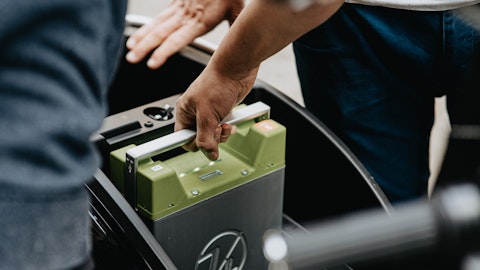In this article, we discuss lithium battery production by country. If you want to read about some top countries in terms of lithium battery production, go directly to Lithium Battery Production By Country: Top 12 Countries.
5. South Korea
Share of global lithium-ion battery manufacturing capacity in 2021: 2.5%
The three major South Korean battery manufacturers, LGES, SK On and Samsung SDI, supply EV batteries to Tesla Inc, General Motors Co and Ford Motor Co which produce more than a quarter of the global EV battery market. LG Energy Solution has a market share of 14%. SK On has a market share of 7% and Samsung SDI has a market share of 5%. Samsung SDI is the world’s sixth-largest EV battery manufacturer. It intends to reach a 23 GWh yearly output capacity.
South Korea is a hub for manufacturing and innovating technology for batteries. Every year dozens of startups are launched in this country. Some of the innovative startups are Standard Energy, Kokam, NS, Zantropy, Elentec and EnerTech International etc.
Posco Chemical, the South Korean battery manufacturer, has expected production to rise from 30,000 tons per year to 90,000 tons per year. If its estimates are fulfilled it will be the largest capacity for a single cathode material plant globally. The capacity will be sufficient to supply batteries for 1 million high-performance EVs. The plant will focus on the production of high-nickel cathodes used in electric vehicles including nickel cobalt manganese aluminum and nickel cobalt manganese cathodes.
4. Poland
Share of global lithium-ion battery manufacturing capacity in 2021: 3.1%
Poland’s export of lithium-ion car batteries reached EUR 6.5 billion in 2021. 90 percent of batteries exported from Poland are lithium-ion batteries, making Poland the largest European producer of electric car batteries and the fifth largest in the world. The export of lithium-ion batteries and their components has exceeded 2 percent of total exports. Experts of the Polish Economic Institute claim that battery production capacity in Poland will grow despite the increase in prices.
Many large companies like LG, SK Hi-tech Battery Materials Poland, KET Poland, Foosung and Enchem have opened their processing plants and factories in Poland. According to the reports of GlobalData, the production of electric vehicle batteries in Europe will increase more than in China by 2030. The demand for batteries will increase to 300 GWh in 2025 and is expected to reach 1300 GWh in 2035.
In June 2022, LG Energy Solution planned to double its capacity of nickel, cobalt and manganese battery cell production lines in Poland for Ford’s EVs by next year. In October, SK Innovation’s SK Technology opened its first production facilities for separators for use in electric car batteries in Poland. This separator plant has an annual capacity of 340 million square meters of separator film. This can equip around 300,000 electric cars. The company has planned a total of four plants for batteries in the Silesia region of Poland.
3. Hungary
Share of global lithium-ion battery manufacturing capacity in 2021: 4%
A Hungarian minister said that South Korean company W-Scope will open its first European plant in Hungary, and it will make 1.2 billion square meters of separator film for electric car batteries. CATL, the world’s largest battery supplier, plans to build Europe’s largest battery plant in Hungary which would be enough to power over 200,000 electric vehicles. The plant will achieve a capacity of 14 GWh.
Samsung SDI and SK Innovation are giant players in battery manufacturing and both companies have their plants in Hungary. Samsung’s battery plant has a production capacity of 50,000 electric vehicle batteries per year. SK Innovation’s plant in Hungary is capable of making 250,000 batteries for electric vehicles due to demand from the Volkswagen Group.
2. United States
Share of global lithium-ion battery manufacturing capacity in 2021: 6.2%
The United States had a lithium-ion battery manufacturing capacity of 44 GWh in 2021 and it is estimated to reach 91 GWh by 2025. Currently, the US is the second largest battery manufacturer in the world. The advancement of technology is also playing a great role in the manufacturing of batteries. Most of the new and innovative technologies for batteries came from the US.
Some of the largest battery manufacturing companies based in the United States are QuantumScape, A123 Systems, Enovix, Stem, SES AI, Amprius Tech, Solid Power and American Battery Technology Company. The market cap of QuantumScape is $2.31 billion. Although other countries are producing more batteries globally, the US is the hub for technology and EV manufacturing. Tesla, an EV automobile company, is a US-based company in Nevada.
The demand for lithium-ion batteries for electric vehicles is rising significantly. It is expected to reach 9300-gigawatt hours by 2030. According to S&P Global Market Intelligence, Contemporary Amperex Technology Co. Ltd. (CATL), the largest battery supplier in the world based in China, was in discussions with its U.S.-based customers to build a manufacturing hub in North America. The biggest battery manufacturers are located in regions with high electric vehicle demand.
1. China
Share of global lithium-ion battery manufacturing capacity in 2021: 79%
Chinese companies are responsible for 56% of the EV battery market, followed by Korean and Japanese companies. Four of the ten largest battery manufacturers are headquartered in China. China is also dominating other parts of the battery supply chain, including refining and mining of battery materials like lithium and graphite. A few of the Chinese battery companies include CATL, BYD, CALB, Guoxuan, Sunwoda, and SVOLT.
From 2021 to 2022, CATL, a leading battery supplier expanded its market share from 32% to 34%. This company is responsible for one-third of the world’s EV batteries. CATL provides lithium-ion batteries to Peugeot, Honda, Toyota, Volvo, Tesla, Hyundai, BMW, Toyota and Volkswagen.
BYD doubled its market share from last year and became number 2 on the list with a market share of 12% in 2022. The market share of CALB is 4%. Guoxuan has a market share of 3%. Sunwoda has a market share of 2%. SVOLT has a market share of 1% as of 2022.
The growth of the companies was driven by the demand for batteries from different car manufacturing companies. Europe, the US, Korea and other giant manufacturers of cars aim to reduce fossil fuel consumption and carbon emissions significantly by 2030. Consequently, the production of lithium has increased by more than 3500% relative to 2020 production.
You can also take a peek at 10 Best Stocks in Each Sector and 10 Best Regional Bank Stocks To Invest In.





